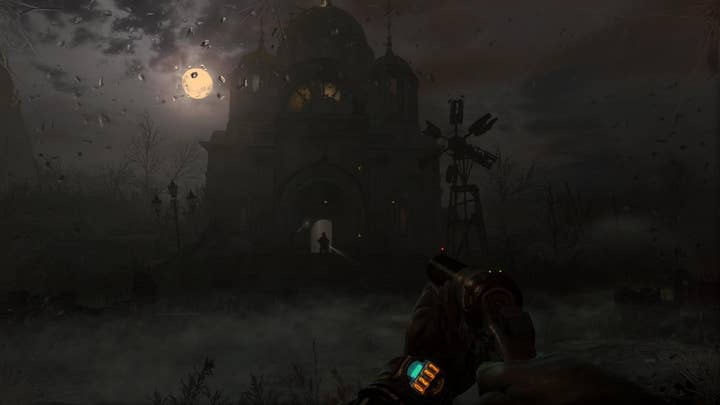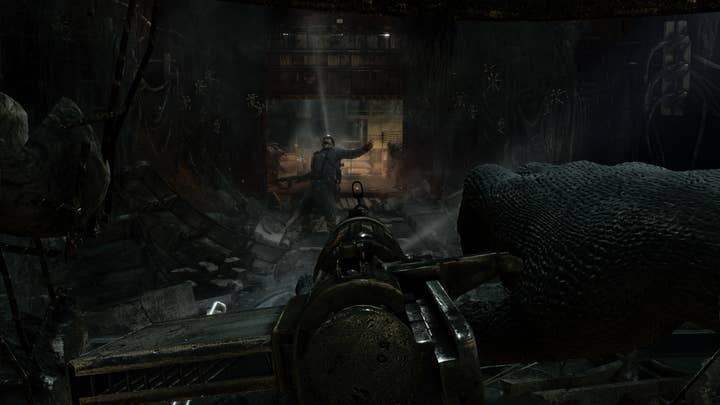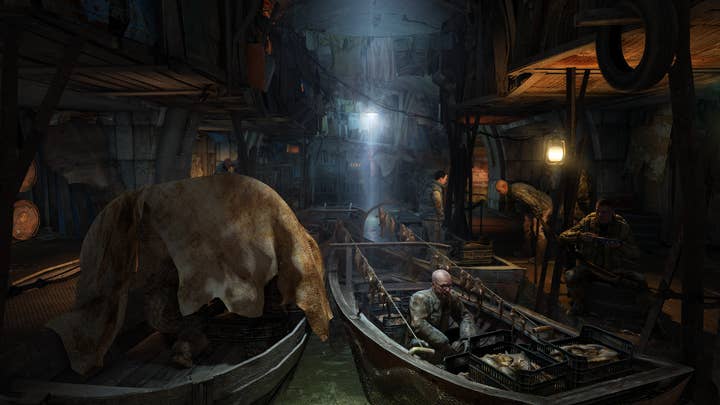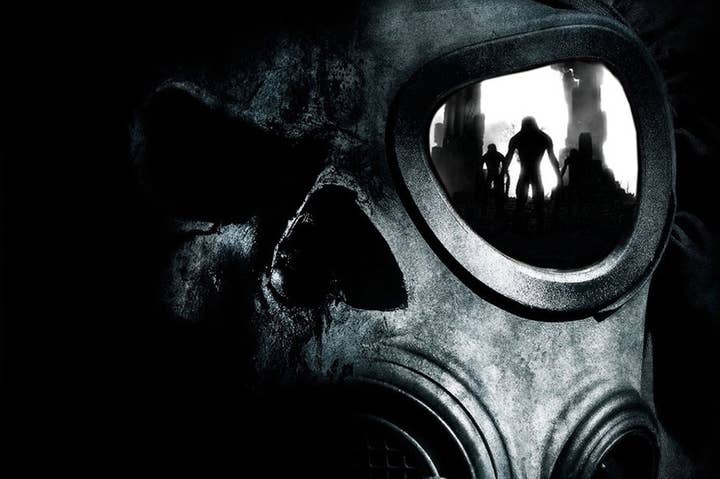Critical Consensus: Metro: Last Light
An uneven disappointment or one of the best linear shooters since Half-Life? Apparently, Metro: Last Light is both
There was an inscrutable alchemy to Metro 2033 that exposed the weaknesses in a host of game reviewers. It was a rough game, to be sure, one blighted by apparently limited resources, making the sort of common and eminently forgiveable mistakes that tend to trap critics who lack a certain imagination and confidence. We may claim to desire originality and creativity in our games, but these ideals are all too often side-lined in favour of indolent criticism.
Metro 2033's stealth mechanics were a tad unpredictable, the guns were somewhat weightless, and the enemies soaked up dozens of bullets before finally succumbing. Games are all too often appraised like motorbikes or washing machines, as if their worth can be measured on a set of scales, successful features piled on one side, weak ones on the other, and a score determined from the balance between the two. So it went with Metro 2033, it's Metacritic score occupying the same dubious turf as Army of Two: The 40th Day, with venerable outlets awarding it 9s, 4s and everything in-between.
"A large shootout against an invading metro faction is dwarfed by any battle in Call of Duty, but feels ten times more important in your journey"
Ludwig Kietzmann, Joystiq
What those high-scoring reviews recognised was that Metro 2033 fell short in areas that a bountiful choice of less imaginative games succeeded, but it excelled in ways that very few games ever have. 4A Games created a vividly detailed world with a fine balance between horror and humanity, ghouls and grit. It was brave enough to embrace the hopelessness of life after the apocalypse, allowing that hardship to seep into the moment-to-moment gameplay with a number of truly inspired mechanics: the steadily depleting gas mask, the currency system, the hand-cranked batteries, the pneumatic sniper rifles, a moral choice system so subtle that most players didn't even realise it existed.
It was a more rewarding and memorable experience than any number of more polished and 'perfect' games - an idea that reviews of its sequel, Metro: Last Light, seem to acknowledge as if everyone had thought so from the beginning. Indeed, the most commonly expressed concern with Last Light is that it would lose the unique, uncompromising roughness of its predecessor - the very thing that divided the critics back in 2010. And for Joystiq's Ludwig Keitzmann, 4A Games has managed to do just that, while eradicating many of the niggles that distracted so many from its predecessor's qualities.

"The flashlight, which is necessary to ward off some of the scarier things scurrying out of Moscow's corpse, needs to be regularly charged with a small handheld generator. Air filters for your gas mask must be replenished when above ground, with a countdown on your watch reminding you how little time is left before the gasps and gulps set in. And you know the visor is a big deal when there's a button for it, dedicated just to wiping off the dirt and blood that accumulates," Keitzmann writes in his 9 out of 10 review.
"Metro: Last Light is smartly conservative: for as much as it revolves around picking everything clean of ammunition and currency (which are sometimes the same thing), it's remarkable how much less rifling there is compared to a BioShock. The infrequency of combat empowers that activity in the same way, with sporadic bursts of violence giving Last Light both a clear rhythm and purpose. To wit, a large shootout against an invading metro faction is dwarfed by any battle in Call of Duty, but feels ten times more important in your journey.
"Each room feels like a self-contained puzzle. Play ebbs and flows between different states without ever jarring you out of the moment, encouraging experimentation"
Edge magazine
"It helps that the shooting mechanisms have been overhauled after Metro 2033, which fumbled whenever you peered down the sights and pulled the trigger. Last Light's guns have a believable heft to them, and unleash clear visual feedback when they strike a target. The charming Frankenstein weapons are still the highlight, and many of them can be paired with a predilection for stealth."
Indeed, the stealth gameplay design is so much better in Last Light that Joystiq even venerates the entirely non-lethal approach of simply landing a hefty punch on your unwitting target - quite an achievement, if true. Regardless, Edge magazine shares in the view that sneaking around Last Light's crumbling world is, "almost always the best option," highlighting it as the single most improved element of the game.
"Making a mistake in 2033 instantly alerted every enemy to your position, and whether you were hidden safely from sight wasn't always clearly telegraphed. It was a frustratingly obtuse system, even if it did evoke plenty of tension," its 8 out of 10 review read. "In Last Light, a blue lozenge on returning protagonist Artyom's always-visible watch lets you know when you're in shadow, and a stab of strings serves as a reminder of the danger when you venture from the gloom. While this solution feels more binary, and occasionally relies on patrolling enemies developing temporary glaucoma, it remains readable at all times and makes you feel deadly.
"Enemies can be distracted in a number of ways, too, such as making a noise, turning out the lights, or creating a fire by shooting at an oil lamp. But while you can toy with them, they also have the tools to swing things in their favour. Flashlights will force you out of hiding places, and your foes will sometimes tip over scenery to create temporary cover... Even silenced weapons will give you away if you're too close to a guard when you use them.

"No matter how much noise you make, though, it's always possible to hide again, and even sneak past the remainder of the forces left searching for you. And it's a thrill when you hear soldiers talking to each other as they close in on the position of your most recent muzzle flash, safe in the knowledge that you're already moving on - or about to slit their throats. As a result, each room feels like a self-contained puzzle that can be tackled in a variety of ways. Play ebbs and flows between different states without ever jarring you out of the moment, encouraging experimentation."
Eurogamer's Rich Stanton is altogether less impressed by 4A Games' efforts to refine and embellish its distinctive earlier work. The score is a 7, which is ostensibly a good thing, though Stanton spends a disproportionately large amount of the review's text detailing its faults, including an opening accusation that Last Light appeals to a "wider audience" with "genre conventions that are perceived to help sales" that is never properly explored or justified in what follows.
"At this point, Metro: Last Light joined a very exclusive club of games that have made me think about what I'm doing with my life"
Rich Stanton, Eurogamer
The crux of the issue seems to be a moment of "tonal idiocy" in which Artyom, the series' protagonist, takes in a burlesque show in Venice, the metro's cultural capital. "It turns out that the famous Bolshoi ballet has now become a variety act including a can-can performance, which is kind of a funny joke," Stanton concedes. "But the way it's made, featuring several see-through bras and an entire row of ridiculously jiggling boobs, is tawdry. I hate to break it to Last Light's developers, but breasts don't move like that.
"Think tawdry is too strong a word? After this, you get to walk through the girls' dressing room in case you want a closer look, and then there are a few more naked women behind frosted glass a bit further up the path. Later, you can pay for a striptease - of course you can! Carry on up the Metro, eh?"
Whether Last Light is indeed tawdry or Stanton is simply a little prudish isn't something that can be fairly assessed from the objective remove of this article - though it's worth mentioning that in a survey of 10 reviews from major outlets, only one other raised concerns about this sequence - but the game's issues don't stop there. According to Stanton, for all of Last Light's achievements in atmosphere and world-building, they are severely damaged by Big Momma: "one of the worst bosses in gaming history." Over three paragraphs, Stanton details an infuriating experience created by a confluence of too many enemies, not enough ammunition, and a final showdown with a near superhuman opponent.
"I eventually beat Big Momma when she got stuck in an AI loop next to a wall and stopped attacking, at which point I fearlessly approached and stabbed her in the face about 200 times. It was probably 10 minutes, but it felt like three hours, and of course as she collapsed I was rewarded with an achievement. At this point, Metro: Last Light joined a very exclusive club of games that have made me think about what I'm doing with my life."

It's worth noting that, at present, Eurogamer's 7 puts it at the very bottom of the current scores for Last Light, and that's a full 3 points higher than the lowest score for Metro 2033. More importantly, the PC version of Last Light has been awarded one perfect score - something that it's predecessor didn't manage on any format - by none other than Quarter To Three's Tom Chick, a reviewer noted for his uncompromising standards. For Chick, Last Light is a masterpiece of subtlety, atmosphere and ambient storytelling that eschews convention at every turn.
"Metro is something that could only come from another country, from its designers, from its artists, from its imagination, from its cultural heritage"
Tom Chick, Quarter To Three
"This is not the apocalypse we know and love," Chick says in his five-star review. "The Fallout games could never shake Bethesda's penchant for fantasy quests and character builds and elaborate inventory sub-games and dialogue trees and hearty, faithful sidekicks. But Last Light has the sombre sense that an apocalypse is not fun. It can be sad, small, dim, and lonely.
"Even though this is a shooter with a mechanical resemblance to a Call of Duty - corridors, guns, more corridors, guns, more corridors - it has a unique tonal quality... Metro is something that could only come from another country, from its designers, from its artists, from its imagination, from its cultural heritage... Last Light once again visits the soul of Russia expressed as an intersection of Nazis and Stalinists. It squeezes big political themes into cramped tunnels. It also explores parenthood. There's even a love scene that's not nearly as hilarious as it could have been. Last Light might not always be successful, but it's almost always admirable.
"The folks at 4A understand how to maximize the narrative value of a linear shooter... They understand setting, mood, lighting, emotions. If a game is just going to trundle you along an amusement park ride of shooting men and monsters, sometimes quite literally on rails, with breaks to overhear conversations if you're so inclined, this is how to do it. And this is also how long to do it. Some will call Last Light a short game; I call it a game without any filler. I also call it one of the best straight-up (neat, no chaser, no RPG elements, no branching storyline) shooters since Half-Life, mute protagonist and all."









